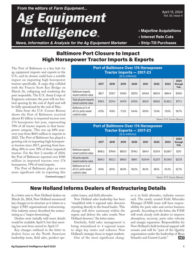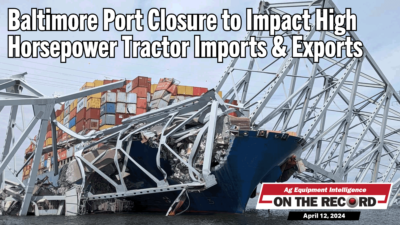An ag industry analyst says ongoing trade tensions aren’t having a huge impact on the overall U.S. economy and that the ag industry should be kept out of the escalating tariff battle between the U.S. and China.
“My gut feeling is China and the U.S. should really back off on the ag side and concentrate more on the services and this intellectual property,” Rich Posson, an analyst with Ag Financial, tells Casey Seymour of 21st Century Equipment and Moving Iron LLC during a recent interview on Farm Equipment’s Used Equipment Remarketing Roadmaps podcast.
Posson’s comments came shortly after Seymour asked for insight on how the trade disputes were impacting the commodity marketplace and the overall economy. Earlier this year, China enacted tariffs against U.S. commodities such as soybeans in retaliation to other tariffs enacted by the U.S., including on steel and aluminum imports from China and elsewhere.
“It certainly has affected soybeans and that has somewhat impacted wheat and corn,” Posson says. But as far as the overall economy is concerned, he quickly added, “it hasn’t affected the U.S. at all.”
“We're seeing higher costs because these trade tariffs, more on the metal side, say for the steel sector, have raised costs to consumers. But you're not seeing an impact on our economy. The stock market is rather optimistic that these trade issues will be resolved. They just don't seem to be that concerned. I think they've decided this import/export complication just won't really bring down the U.S. economy,” he says.
In fact, most of the negative impact can be seen in China’s stock markets. Posson says that while the U.S. markets have been trending upward, Chinese stocks have been going down all year long.
You can catch the entire interview with Posson on the Used Equipment Remarketing Roadmaps podcast here.
Farmland Prices
The podcast interview also touches on other topics, such as the value of farmland. Seymour points out he is seeing farmland being sold for as much as $20,000 an acre in the corn belt. Posson says he is seeing ranges between $10,000-$20,000, though he views that as high priced.
Posson explains that he sees a chance for record-high pricing in commodities over the next decade. However, he adds that he doesn’t see as many record years as he would have 10 years ago. “So the super cycle of production has really come up at a fast pace and kind of clipped it a little bit relative to what the demand can actually do here. It makes me a little less bullish, especially when it comes to that kind of price for land. To me, the real value is in that $2,000-$8,000 area.”
Equipment Sales
During the interview Seymour also offers a prediction of his own that 2018 will be a strong year overall for farm equipment sales, in no small part because of replacement demand. Farmers now “have to make some hard decisions about equipment,” in that they either have to pay for expensive repairs or instead just buy new equipment.
Posson says he was looking at data recently that suggested the equipment market is “overdue for a bit of a rebound.”
“Especially on the machinery side, you have to think in terms of what's the payback on improving your technology because if you look at farming in the U.S., you may not realize there's a lot of land that could probably be pulled back into production. I feel like we're rather limited. So, the point is you have to look at technology to improve not only your yields but how much land you can handle.
“Repairs can just keep you going, but we all know that boy eventually repairs get to be a drag too. I'm in the camp of trying to stay current on equipment on the farm.”
See previous coverage of how trade tensions might impact equipment dealers: North American Dealers Expect Trade Tensions Will Hurt Business.




Post a comment
Report Abusive Comment